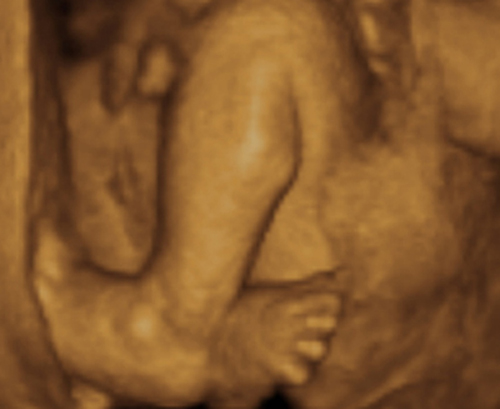You are 30 Weeks and 6 Days 64 days to go…
Once your baby’s production of red blood cells is in full swing, in theory your immune system could begin to harm your baby.
Your baby today
Here the baby is resting on the placenta, seen at the right-hand
side of the image, with the umbilical cord just below the baby’s chin.
The eyes are closed and this image was taken at a time when the baby was
at his quietest, during deep sleep.

At 30 weeks
your baby’s red blood cell production switches from the liver to the
bone marrow. These red blood cells are unlikely to be of the same blood
group as your own. Small numbers of these red blood cells often leak
across the placenta; your body recognizes them as foreign and attacks
them.
Your blood group is
not important because, although antibodies to blood groups A, B, AB, or
O attack your baby’s cells in your circulation, they are too large to
cross the placenta and attack your baby. Therefore differences in ABO
blood groups do not matter. However, everyone is also Rhesus positive
(85 percent) or negative (15 percent). If you are Rhesus negative and your partner is Rhesus positive, your baby may also be Rhesus positive.
Rhesus negative women
produce antibodies to rhesus positive blood cells; these are smaller
than ABO antibodies and can cross the placenta. Once they do, large
numbers of antibodies can attack your baby’s blood cells, leading to
anemia. First pregnancies are rarely affected. In pregnancy you are
given an injection of the rhesus antibody “Rh immunoglobulin (RhIg)”
around now—with another after the birth. The Rh immunoglobulin (RhIg) is
in a form that it is too large to cross the placenta. This mops up any
of your baby’s blood cells in your circulation, preventing your immune
system from attacking your baby.
Amniotic fluid
Your baby excretes and reabsorbs
about 16 fl oz (0.5 liter) of urine daily, and the amniotic fluid
reaches a peak volume of 1.75 pints (1 liter) at 35 weeks. After this
time the volume starts to decline and can be as little as 3.5–7 fl oz
(100–200 ml) in an overdue pregnancy (see Overdue Baby).
Low levels of amniotic fluid, known as oligohydramnios ,
can be a sign of a growth-restricted baby or a baby with kidney
problems. Excessive amniotic fluid, known as polyhydramnios,
may be seen in twin or triplet pregnancies, and is also associated with
physical abnormalities in the baby or diabetes in the mother.
After 40 weeks, the fluid
level needs to be checked regularly to ensure that there is not too
steep a decline in fluid levels. If the overdue baby is thought to be at
risk, an induction will be recommended.
… Your health
A good night’s sleep
Insomnia is a common problem
during pregnancy and can lead to fatigue, feelings of stress and
anxiety, and irritability. Whether it’s brought on by your increased
size, back pain, heartburn, getting up to empty your bladder, or
something else, insomnia is not fun. Taking a warm bath or having a
small snack before bed may help, as can relaxation techniques, such as
deep breathing. A calming scent in a potpourri or fragrance on your
pillow may aid relaxation. Make sure to exercise during the day. If you
still can’t sleep, get up and do something relaxing: read a book, watch
TV, or listen to calming music until you feel sleepy. And try to make up
for lost sleep with daytime naps.

You are 31 Weeks Exactly 63 days to go…
Epidural is a common form of pain-relief during labor and may be an option for you if you have a low pain threshold.
Your baby today
One leg is shown here crossed over the other. Your baby can
still stretch the legs out fully and even curl up in such a way that the
feet can rest on top of the head: just because you’re kicked on one
side doesn’t mean that the head will be on the other.

Many women have decided that they want a pain-free delivery with an epidural even before they go into labor. It’s good to know, however, that labor
has to be well established before you can have an epidural, so you’ll
still experience some painful contractions. Epidurals generally work
well, but sometimes the block isn’t complete or is more effective on one
side than the other. Some women decide to have an epidural because they
know they’re unlikely to cope well with labor pain. Many women start
off saying that they don’t want an epidural and change their minds
halfway through—if it’s your first pregnancy, you can’t possibly know
how you’ll feel.
An elective cesarean is one that is planned and generally performed for medical reasons—for example, because of a low-lying placenta—and
not simply because a woman wants to have one. Having a cesarean is
major abdominal surgery and in most circumstances it is safer to have a
vaginal delivery. Recovery after a cesarean usually takes longer than
after a vaginal birth, so one is only performed if necessary.
Tocophobia
This condition is an intense fear or dread of childbirth.
There are two types: primary tocophobia predates pregnancy and can
start as early as adolescence; secondary tocophobia is associated with
an earlier traumatic experience in childbirth. This fear can manifest
itself as nightmares, intense anxiety, or panic attacks.
If you have tocophobia,
your doctor will refer you to a consultant obstetrician who deals in
mental health issues, or you may be referred directly to a psychologist
to discuss your fears. Some experts believe that hypnotherapy can help
to tackle any subconscious fears of childbirth. An elective cesarean may be recommended if your fear of having a vaginal birth cannot be overcome.
… Relationships
Comfortable lovemaking
You may need to experiment
to find lovemaking positions that are comfortable. Most women find that
the missionary position becomes increasingly uncomfortable as your
partner presses on your belly. You may find being on top is enjoyable
and does not put pressure on your belly. Lying in the spoons position,
with your partner behind you, can also be pleasurable. Other positions
that don’t restrict your pleasure and are comfortable include sitting
together, kneeling while your partner enters from behind, and lying side
by side with your legs entwined.
